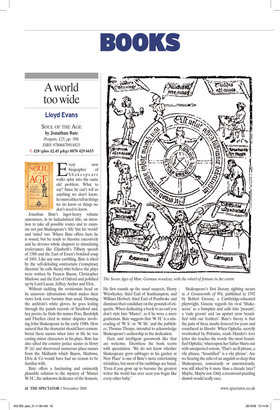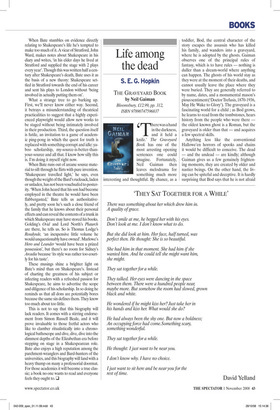A world too wide
Lloyd Evans
SOUL OF THE AGE by Jonathan Bate Penguin, £25, pp. 500, ISBN 97806870914821 ✆ £20 (plus £2.45 p&p) 0870 429 6655 Every new biographer of Shakespeare walks splat into the same old problem. What to say? Since he can’t tell us anything we don’t know, he must either tell us things we do know or things we don’t need to know.
Jonathan Bate’s ingot-heavy volume announces, in its lackadaisical title, an intention to take all possible routes and to examine not just Shakespeare’s ‘life’ but his ‘world’ and ‘mind’ too. Where Bate offers facts he is sound, but he tends to theorise excessively and he devotes whole chapters to stimulating irrelevances like Elizabeth’s Tilbury speech of 1588 and the Earl of Essex’s botched coup of 1601. Like any sane earthling, Bate is irked by the self-deluding contrarians (‘conspiracy theorists’ he calls them) who believe the plays were written by Francis Bacon, Christopher Marlowe and the Earl of Oxford and polished up by Lord Lucan, Jeffrey Archer and Elvis.
Without tackling the revisionists head on he uncovers information which makes their views look even barmier than usual. Donning the archivist’s white gloves, he goes leafing through the parish records of Stratford and, hey presto, he finds the names Peto, Bardolph and Fluellen cited in minor disputes involving John Shakespeare in the early 1580s. How natural that the dramatist should have remembered these names when later in life he was casting minor characters in his plays. Bate has also sifted the country justice scenes in Henry IV (ii) and discovered numerous place-names from the Midlands which Bacon, Marlowe, Elvis & Co would have had no reason to be familiar with.
Bate offers a fascinating and eminently plausible solution to the mystery of ‘Master W. H.’, the unknown dedicatee of the Sonnets. He first rounds up the usual suspects, Henry Wriothesley, third Earl of Southampton, and William Herbert, third Earl of Pembroke and dismisses their candidacy on the grounds of etiquette. When dedicating a book to an earl you don’t style him ‘Master’, as if he were a mere gentleman. Bate suggests that ‘W. H.’ is a misreading of ‘W. S.’ or ‘W. Sh.’ and the publisher, Thomas Thorpe, intended to acknowledge Shakespeare’s authorship in the dedication.
Facts and intelligent guesswork like that are welcome. Elsewhere the book teems with speculation. ‘We do not know whether Shakespeare grew cabbages in his garden at New Place’ is one of Bate’s more entertaining trivialities, but most of his ramblings are banal. ‘Even if you grow up to become the greatest writer the world has ever seen you begin like every other baby.’ Shakespeare’s first literary sighting occurs in A Groatsworth of Wit, published in 1592 by Robert Greene, a Cambridge-educated playwright. Greene regards his rival ‘Shakescene’ as a bumpkin and calls him ‘peasant’, a ‘rude groom’ and ‘an upstart crow beautified with our feathers’. Bate’s theory is that the pain of these insults festered for years and resurfaced in Hamlet. When Ophelia, secretly overlooked by Polonius, reads Hamlet’s love letter she reaches the words ‘the most beautified Ophelia,’ whereupon her father blurts out with unexpected venom, ‘That’s an ill phrase, a vile phrase, “beautified” is a vile phrase’. Are we hearing the echo of an anguish so deep that Shakespeare, consciously or unconsciously, was still irked by it more than a decade later? Maybe. Maybe not. Only a crossword-puzzling dimwit would really care. When Bate stumbles on evidence directly relating to Shakespeare’s life he’s tempted to make too much of it. A vicar of Stratford, John Ward, makes notes about Shakespeare in his diary and writes, ‘in his elder days he lived at Stratford and supplied the stage with 2 plays every year’. Though this was written half a century after Shakespeare’s death, Bate uses it as the basis of a new theory: Shakespeare settled in Stratford towards the end of his career and sent his plays to London without ‘being involved in actually putting them on’.
What a strange tree to go barking up. First, we’ll never know either way. Second, it betrays a misunderstanding of theatrical practicalities to suggest that a highly experienced playwright would allow new works to be staged without being intimately involved in their production. Third, the question itself is futile, an invitation to a game of academic ping-pong in which the quest for truth is replaced with something corrupt and idle: yaboo scholarship, my-source-is-better-thanyour-source and all that. I know how silly this is. I’m doing it myself right now.
When Bate runs out of arcane source material to sift through he flirts with pure invention. ‘Shakespeare travelled light,’ he says, even though the weight of the Bard’s rucksack, laden or unladen, has not been vouchsafed to posterity. ‘When John heard that his son had become employed in the theatre he would have been flabbergasted,’ Bate tells us authoritatively, and pretty soon he’s such a close friend of the family that he knows about their personal effects and can reveal the contents of a trunk in which Shakespeare may have stored his books. Golding’s Ovid and Lord North’s Plutarch are there, he tells us. So is Thomas Lodge’s Rosalynde, ‘an inexpensive little volume he would unquestionably have owned’. Marlowe’s Hero and Leander ‘would have been a prized possession’, but there’s no room for Sidney’s Arcadia because ‘its style was rather too courtly for his taste’.
These musings shine a brighter light on Bate’s mind than on Shakespeare’s. Instead of charting the greatness of his subject or infecting readers with a refreshed passion for Shakespeare, he aims to advertise the scope and diligence of his scholarship. In so doing he reminds us that all dons are potentially bores because the same sin defines them. They know too much about too little.
This is not to say that this biography will lack readers. It comes with a stirring endorsement from Simon Russell Beale, and it will prove invaluable to those fretful actors who like to clamber ritualistically into a chronological bathoscope and dive, dive, dive into the dimmest depths of the Elizabethan era before stepping on stage in a Shakespearean role. Bate also enjoys a high reputation among the parchment-wranglers and Bard-hunters of the universities, and this biography will land with a heavy thump on many a professorial doormat. For those academics it will become a true classic; a book no one wants to read and everyone feels they ought to. ❑



































































































 Previous page
Previous page